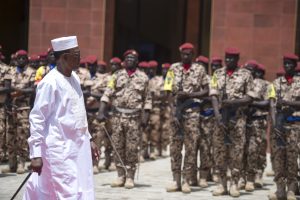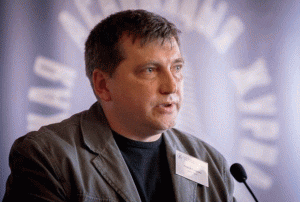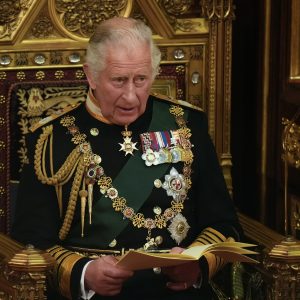27 May 2022 | Chad, News and features

Swearing in ceremony of President Idriss Deby Itno of Chad in 2016. Photo: Paul Kagame, CC BY-NC-ND 2.0
More than a year after Chad’s former president was killed in battle, the central African country remains in turmoil and freedom of expression remains under attack.
Idriss Déby Itno was killed in April 2021 on the battlefront between government troops and rebels from the Front for Change and Concord in the north of the country. His death was announced just a day after provisional results from the 11th April president election showed he had won re-election.
The election result was widely seen as dubious. Leading opposition figure Saleh Kebzabo had withdrawn from the elections after family members of another candidate were killed during a deadly shootout.
Chad has been under the increasingly authoritarian grip of Idriss Déby Itno since 1990 when he seized power in a coup.
In March 2018, Déby had implemented a social media ban following widespread public protests against constitutional changes that would have allowed him to rule until 2033. The ban was lifted only 16 months later.
The country has been the target of regular internet shutdowns by the government. The KeepItOn coalition says there were more than 900 days of internet shutdowns, including throttling of internet speeds, total internet blackouts as well as the social media blocks, between 2016 and 2021.
After Déby’s death, the military took control, dissolving parliament and putting a transitional military council (TMC) in charge of the country under the leadership of Déby’s son Mahamat.
The council promised free and democratic elections within 18 months, following a national reconciliation dialogue that would involve parties from all sides.
In September, the TMC appointed a 93-member national transitional council to perform the functions of government. However, some prominent members of Wakit Tama, a coalition of human rights groups and opposition figures, who had denounced the coup were excluded for this.
That process has since moved slowly, and free and fair elections look unlikely any time soon. An inability to agree on who should be involved in the council and any national reconciliation dialogue has slowed the process to a crawl, although some of the parties are now in the Qatari capital Doha taking part in what is being called a pre-dialogue, a process that has already lasted two months.
The transition to fair and free elections has now been thrown into even greater disarray after a number of civil society leaders were detained during protests on 14th May organised by Wakit Tama.
During the protests, several symbols of France’s colonial power, including a number of Total petrol stations, were attacked and policemen injured. Wakit Tama and the four arrested have denied any involvement in the violence.
The four arrested were Gounoung Vaima Gan Fare, secretary general of the Union des Syndicats du Tchad, Youssouf Korom Ahmat, secretary general of the Syndicat des commercants fournisseurs du Tchad, Koudé Mbainaissem, a lawyer and president of the Association for Freedom of Expression, as well as Wakit Tama coordinator Max Loalngar.
The protests were intended to highlight human rights violations in the country, call for the inclusion of human rights defenders in the transition and oppose a continuing French military presence in Chad.
Opposition leader Saleh Kebzabo said the protests threatened the process of reconciliation.
Three days after the protests he tweeted, “In Doha, there is a Chad in miniature where nearly 200 Chadians have been engaged in a debate for two months to participate in the [national reconciliation dialogue]. All Chadians are waiting for this unique moment for a real rebuilding of the country, and I believe it is a unique opportunity.”
“During this time, we learn that other Chadians are preparing the [dialogue] in their own way by marches to ransack and loot, against the French presence in Chad. This is a false debate that risks hiding all our real problems, which are unfortunately many.”
The four are currently being detained at the high security Mossoro prison and will face a court hearing on 6th June, although none has yet been charged with any offence. Front Line Defenders believes that they are being targeted “solely as a result of their legitimate and peaceful work in defence of human rights”. Human Rights Watch calls the detentions “politically motivated”.
Despite the pre-dialogue in Doha, the government has now postponed the main dialogue on a transition to democracy to some unspecified date in the future. The omens are not good.
26 May 2022 | News and features

Andrei’s beloved Liverpool FC has won two trophies this season and will play UEFA Champions League final at the end of May. Has he been able to follow the Reds? We simply don’t know. Credit: Andrei Aliaksandrau
Belarus journalist and human rights defender Andrei Aliaksandrau marks 500 days behind bars in his native Belarus today. The 44-year-old spent several years working with Index on Censorship, as well as coordinating the Civic Solidarity Platform, a coalition of 60 human rights groups. He is a passionate Liverpool FC supporter. He is not only our former colleague, but also our friend.
Arrested along with his girlfriend Iryna Zlobina, another political prisoner of the brutal regime of Alexander Lukashenko, Andrei faces up to 15 years in prison if convicted. The accusation? “Treason to the State”. He was arrested after paying off fines given to journalists and protesters who took to the streets following the fraudulent 2020 presidential election, “won” by Lukashenko.
It’s hard to imagine how Andrei feels about his freedom being deprived in such a cruel and unfair way. How many major worldwide events since January 2021 has he been prevented from following more closely? The Taliban’s return to power in Afghanistan, the migration crisis on the border between Poland and Belarus and the Russian invasion of Ukraine. Surely Andrei would be taking a stand on these matters and collaborating in some way, but that basic right was ruthlessly taken from his hands.
Has Andrei been able to follow the news surrounding his beloved Liverpool FC? The Reds narrowly missed winning the Premier League in the last round of the 2021-2022 season. “You’ll Never Walk Alone,” was chanted in unison by everyone in the Anfield stadium after the match against Wolverhampton. Given the chance, Andrei would undoubtedly have joined in. On 28 May, Liverpool faces Real Madrid in Paris, in the final of the European Champions League. Most likely, televisions in prison (if there are any) will not show the match, and our friend will not see the emotions of the game. Instead, he will have to follow it with his heart. But in fact, he might not even know that his team is playing such an important match.
Andrei was jailed just as the first Covid-19 vaccinations were becoming available. Has he even had his first jab, let alone the two or three that wider society has been offered? If not, his health is at risk in addition to his liberty.
Currently, there are more than 1,000 political prisoners in Belarus, as far as we know. As the days go by, our duty grows to do everything we can to help Andrei, Iryna and all of the others imprisoned merely for exercising their free expression. We must release them from this nightmare. There is an online petition that everyone can sign to demand Andrei and Iryna’s urgent and unconditional release. You can stand with us by signing your name alongside ours.
Sign the petition
20 May 2022 | Belarus, Media Freedom, News and features, Russia, Ukraine
The free press in Belarus is under threat like never before in the wake of the disputed re-election of Aleksandr Lukanshenka in August 2020, with journalists being threatened, fined, arrested and tortured for speaking out against the country’s ruler. Indeed, former Index employee and contributor Andrei Aliksandrau remains in prison, facing a sentence of up to 15 years for alleged “high treason”.
A year after the elections, the Belarusian authorities went a step further in clamping down on media freedom, banning the country’s journalism body, the Belarusian Association of Journalists.
Despite the challenges, the BAJ continues to receive support and, at the end of April, the organisation was awarded the 2022 UNESCO/Guillermo Cano World Press Freedom Prize.
Index spoke with BAJ chair Andrei Bastunets in the wake of the award, talking about the worsening situation for independent media and how BAJ continues to support press freedom.
Is it still possible to work as an independent journalist in Belarus following the start of the war in Ukraine?
“The key problems for Belarusian independent journalists arose before the war in Ukraine, and even before the 2020 presidential election. But after the elections – and journalists’ coverage of post-election protests – the pressure on the media, journalists and bloggers has increased dramatically (although earlier Belarus had bad ranking positions in international free speech ratings and indexes too). In 2021, many journalists and even entire editorial offices were forced to flee the country in order to avoid criminal prosecution by the Belarusian authorities and to be able to continue their professional activities.”
“A lot of Belarusian journalists – more than 100 – who were forced to leave their country chose Ukraine as a place of refuge. But after the start of the Kremlin’s war against this country, they had to leave their homes and belongings again and move to other countries. Journalists and bloggers who continue to work in Belarus face additional persecution for expressing their anti-war position. However they spread truthful information on what is happening. Last week, Baranavichy-based journalist Yury Hantsarevich was detained and accused of passing on information about Russian troop transfers in Belarus.”
How many journalists are still in detention in Belarus?

Andrei Bastunets, chairperson of the Belarusian Association of Journalists
“There are 24 journalists behind bars at the moment. Eight of them are serving their terms in prison, and the rest are in custody pending trial. All are deemed political prisoners by Belarusian human rights organisations.”
“In the first four months of 2022, five sentences were handed down against journalists in criminal cases – from 1.3 to 2.5 years in prison. The maximum punishment for a journalist has been a 15-year strict regime sentence for blogger Ihar Losik, who was a consultant for the Belarusian service of Radio Liberty.”
“My friend and former Index staff member Andrei Aliaksandrau has been in jail since January 2021; and recently the Belarusian Investigative Committee reported on the charges against him under four criminal articles, including Article 356 (high treason) which outlines a punishment of up to 15 years in prison.”
How is the war (or special military operation as Putin would have it) being reported in Belarus?
“There is a difference in the approaches of state-run and independent media outlets. In the news agenda of the independent media, the war in Ukraine is being called ‘war’ and it is on their front pages. These media outlets are publishing mostly online now because they do not have an opportunity to publish in print after printing houses and state monopoly distribution chains were banned from cooperation with the independent press. The state television and other government-backed media in Belarus are reporting on the war in Ukraine spreading the narratives of the Russian pro-Kremlin media.”
Is the BAJ still operating and is it having to do so from exile?
“In August 2021, the Supreme Court of Belarus ordered the dissolution of the organisation, at the request of the country’s Ministry of Justice. Now, BAJ is not an organisation registered by the Ministry, it is not a formal structure. It is about 1,300 people united in implementing their common idea and their mission – to expand the space of free speech in Belarus. And an official’s resolution has not affected our activities. Most of the organisation’s leadership had to leave the country after a series of police raids and interrogations by investigators, after arrests of our colleagues and friends, but we continue our work from abroad. We treat all media outlets of Belarus, regardless of whether they stayed in the country or moved abroad, as a single Belarus media sector. And we are providing all the necessary and possible support to this media sector.”
How important is the recognition through awards of BAJ, such as the Unesco award recently?
“We regard the UNESCO award as support for the entire independent journalistic community in Belarus. By the way, within literally two days, BAJ received three awards. In addition to UNESCO/Guillermo Cano World Press Freedom Prize, there was the award from the Swedish section of Reporters Without Borders (RSF) and Difference Day Honorary Title for Freedom of Expression from Brussels ULB and VUB universities. They are very important for our organisation as appreciation of our work, but even more as a high assessment of Belarusian journalists’ work in extremely difficult conditions. And, of course, it is important for us that Belarus has returned to the front pages of the international media. Although, we understand indeed that current events in Ukraine are attracting general attention as the state of affairs in the region and of the entire system of world security formed after WWII depend on their development.”
20 May 2022 | Opinion, Ruth's blog, United Kingdom

The Prince of Wales delivers the Queen’s Speech during the State Opening of Parliament 2022. Alastair Grant/PA Wire/PA Images
Unintended consequences and ideological incoherence. These phrases have dominated all discussions I have had in recent days about the British Government’s current approach to freedom of speech and expression.
There are now at least six pieces of legislation, outlined in last week’s Queen’s speech, which will be debated by the UK Parliament, which have a direct impact of our collective ability, in the UK, to exercise our rights to free expression. As individual pieces of legislation some are of value, but others are seemingly a political tool to set the scene for a battle about culture wars at the next British General Election, rather than to fix a problem in our society. That would be bad enough, but when considered in the round, rather than as individual laws, we are seeing a hotchpotch approach to free speech which is both ideologically incoherent and inconsistent as well as having numerous unintended consequences.
The best case in point is the proposed Higher Education (Freedom of Speech) Bill, which sets out to protect academic endeavour on campus, aiming to ensure that some of the most controversial and/or obscure issues are protected areas of academic enquiry. The Bill aims to give academics stronger protections in law to both study and discuss these issues. I have written previously about my concern that this is attempting to fix a problem that doesn’t exist and that most of the proposed provisions are already accessible under other legal frameworks, but as a principle how could Index on Censorship not seek to protect academic freedom both at home and abroad? But that brings to me to one of the inherent contradictions in the Government’s overall approach.
The Bill would provide legal protections to enable an academic to give a lecture on replacement theory – the idea that white populations risk becoming minorities as a result of immigration and high birth rates among migrants – something which I consider to be a racist and pernicious doctrine.
Replacement theory, while abhorrent, is not considered to be illegal speech, it could however be viewed as harmful speech. If the lecture was, however, then placed on a social media platform, under the Government’s proposals in the Online Safety Bill, it could be considered to be “legal but harmful” content and subject to deletion. So, you could give a lecture using protected speech in an auditorium, but your students wouldn’t be able to access it online, to debate and challenge it, and other academics wouldn’t be able to challenge the assertions of the controversial academic in any meaningful way online. So how does that protect free speech?
The British Government is also proposing a new Bill of Rights to enshrine UK human rights in a post-Brexit world. The Justice Secretary, Rt Hon Dominic Raab MP, has stated that: “We will still be clamping down on those who try and use either media or free speech to incite violence, to radicalise terrorists, or to threaten children. All of those safeguards will be in place. But we’ve got to be able to strengthen free speech, the liberty that guards all of our other freedoms, and stop it being whittled away surreptitiously, sometimes without us really being conscious of it. So it will have a different status in the pecking order of rights and I think that will go a long way to protecting this country’s freedom of speech and our history, which has always very strongly protected freedom of speech.”
Which of course to someone like me who cherishes our right to freedom of expression is manna from heaven – or is it? Because at the same time as the Justice Secretary is seeking to make freedom of speech the foundational human right in the British system, the Home Secretary is reviewing the Official Secrets Act in the guise of a new National Security Bill. This time, an exemption for a public interest defence, a longstanding provision which protects journalists when they publish the accounts of whistle-blowers relating to national security, seems to have been forgotten. This completely undermines the premise of media freedom and journalism being able to hold power to account.
The British Government is also proposing new legislation to severely limit the right to protest in the UK under a new Public Order Bill and a new Data Reform Bill which will change our rights to privacy online. The Government is also consulting on new legislation to counter strategic lawsuits against public participation (SLAPPs) in order to stop the misuse of our libel system to silence the media and campaigners.
In other words, the Government is speaking a great deal about freedom of speech in the UK at the moment, but seemingly without any of the relevant departments or Government agencies talking to each other. As the inherent contradictions in their use and definition of free speech become more obvious, we will see a national picture in the UK which is even more convoluted and probably open to legal challenge. Index is calling for a more strategic and defined approach to free speech in the UK and will be working with partners across the political spectrum to try and get to a place that protects all of our speech.




